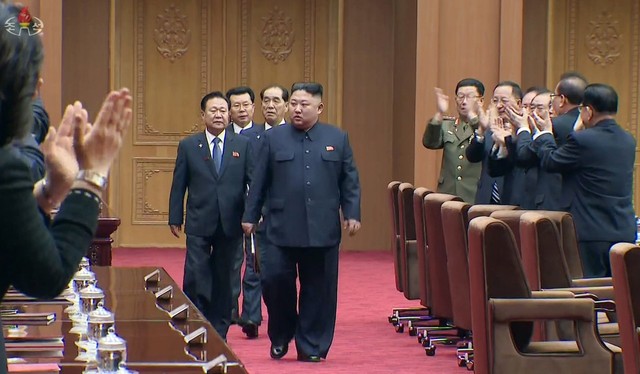 |
|
North Korean leader Kim Jong-un prepares to give a policy speech before the Supreme People’s Assembly on Apr. 12.
|
Contrary to Kim Jong-un’s speech, Moon has never acted as a disinterested party
“The authorities in South Korea must be a responsible party that defends the interests of the [Korean] nation rather than acting as meddlesome 'mediator' and 'facilitator' . They must agree and coordinate with our position and commitment, [showing] their sincerity by practical action, not by words[. . .]” This was the tough message sent by North Korean leader Kim Jong-un in a policy speech before the Supreme People’s Assembly (SPA) on Apr. 12. It included a mixture of some things worth consideration and other things that were inappropriate. First, to clear up a misunderstanding, South Korean President Moon Jae-in never said that South Korea was not an “interested party.” Consider his remarks at a Feb. 11 meeting of Blue House senior secretaries and aides, where he declared South Korea to be the “most important stakeholder in the major shift in world history that is currently taking place on the Korean Peninsula.” It is true that Moon has positioned himself as a “catalyst” between Pyongyang and Washington. Articulating his Korean Peninsula policy for the first time in a speech at Germany’s Koerber Foundation on July 6, 2017, he set the goal of “dismantling the Cold War regime on the Korean Peninsula and establishing permanent peace.” Denuclearization of the Korean Peninsula cannot be achieved without historic progress in inter-Korean relations and the easing of North Korea’s hostile relationships with the US and Japan. The North Korean nuclear issue is not the only part of the story – which is why Moon has referred to the changes in the peninsula’s political situation following the Pyeongchang Winter Olympics in February 2018 as a “Korean Peninsula peace process” rather than a “denuclearization process.” The North Korean nuclear issue is a conjoined twin of sorts with the hostile relationship between Pyongyang and Washington. It is not something that can be resolved without change on both sides motivated by the establishment of trust. This is why Moon has been playing the part of the “meddling catalyst” – he is acting as both stakeholder and catalyst. There is nothing wrong with that. The use of the rather undiplomatic “meddling” in a policy speech seems to be an issue of Kim Jong-un’s linguistic sensibilities. Moon has also long since dropped his use of the term “mediator.” The mediator’s role is that of a disinterested third party; South Korea is no third party here. The problem is not an error in understanding. In his celebratory address for National Liberation Day last year, Moon declared that the “advancement of inter-Korean relations is not a secondary effect of progress in North Korea-US relations – it is the advancement of inter-Korean relations that promotes the denuclearization of the Korean Peninsula.” This is why he has clearly distanced himself from calls for “denuclearization before any other measures,” instead pursuing a strategy of improved inter-Korean relations and denuclearization in tandem. At the same time, no progress has yet been made in the three major areas of economic cooperation – the Kaesong Industrial Complex, tourism at Mt. Kumgang, and the linking of South and North Korean railways and roads – while senior South Korean government officials continue to talk about working “within the sanctions framework.” The real problem is the stagnation taking place in inter-Korean relations. Problems in any of the three bilateral relationships – South and North Korea, South Korea and the US, and North Korea and the US – translate into a failure to make progress with the Korean Peninsula peace process. Leaving aside Kim Jong-un’s calls for “practical action rather than words,” Moon should be channeling more energy into increasing Seoul’s autonomy from Washington to broaden the scope of inter-Korean relations. That being said, Kim’s call on Seoul to “coordinate with our [North Korea’s] position” was inappropriate. Each of the three parties – South and North Korea and the US – is bound to act according to its own different identity, based on its own calculations of relative strength and weighing of interests. Efforts are needed from all three to bridge differences and broaden the base of shared interests. We can’t afford to stop working to understanding one another if we are to find our way through the proverbial eye of the needle to arrive at the broader plain of peace on the Korean Peninsula. By Lee Je-hun, senior staff writer Please direct comments or questions to [english@hani.co.kr]






